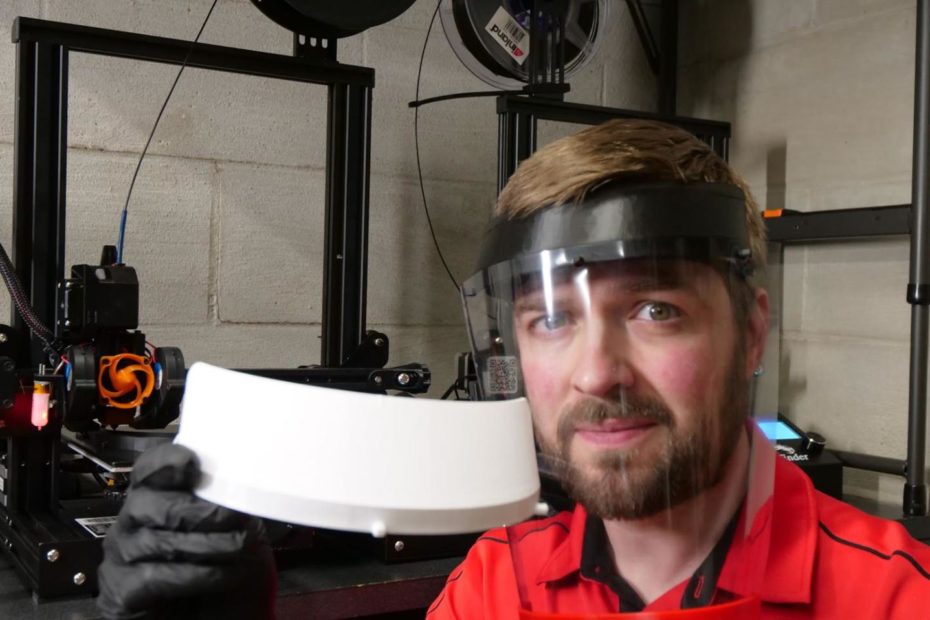“What we’ve built is not going anywhere,” said Josh Hildebrand, leader of Shields Up of Northeast Ohio, in a live stream to the OSMS Facebook group. Indeed, Hildebrand and company created something special in Ashland, Ohio — a response to the COVID-19 pandemic designed for the long haul. As new cases rise in many states, the name of the game for local response groups is “sustainability,” as Hildebrand explained.
In early March Hildebrand began closely monitoring COVID-19, along with what others from around the globe experienced, in our Open Source COVID-19 Medical Supplies Facebook group. By the end of that month he knew he needed to act and started Shields Up, his own local response group in Ashland, Ohio. Fortuitously enough, Hildebrand bought a 3D printer in January to make parts for electric skateboards, which provided him the know-how to begin production. In early April, Hildebrand worked 100-hour weeks to turn out crucial face shields for local nursing homes. The Shields Up group continued to expand through friends, acquaintances, and fellow Ashland residents and eventually partnered with the Mapleton Local School District which had its own 3D printer lab with 11 printers. Hildebrand trained three school district employees, including the superintendent, to operate those 11 printers, allowing the school district to start cranking out hundreds of face shields per day. Hildebrand also set volunteers up with individual printers in their own homes, who then produced shields full-time, or even after a long day at work. Community members without technical skills came through with donations for filament and printers to sustain the effort. “Strangers who had never met before — those individuals started to reach out and join this cause, and we were able to produce at an incredible rate,” Hildebrand said.
Early on, Hildebrand discovered that the market price for face shields was $20, which he described as “gouging.” The group sells face shields at $6 apiece; a much better deal for buyers but still enough to cover the thousands of dollars being spent on necessary materials and supplies for shield production. Demand peaked in mid-May when salons and small businesses began to re-open, and the group met the challenge. Shields Up produced face shields in different fun colors, effectively fulfilling the shortage in Ashland medical centers. As a result, the group expanded distribution of face shields to grocery stores, dentists, small businesses, and even nursing homes outside of Ashland who had already reported positive COVID-19 test cases. To date, the group’s production totals over 4,000 shields. “Face shields were one of those easy ways to prevent spit and droplets from transmitting between individuals, in addition to the masks and the goggles that they were wearing,” Hildebrand said of the nursing homes soliciting shields. “We were able to fast-track some orders to organizations like those that had an immediate need.”
As the effort moved into its fourth month, Hildebrand worked to make the effort sustainable for the foreseeable future. Through his IT business FiveForge and with his business partner Kyle McFarlin, Hildebrand plans to continue investing in production. As demand dipped and volunteers returned to work, Hildebrand incorporated the distributed factory system he created into his business. On top of his day job he still produces shields and maintains the 3D printers, remaining vigilant should demand spike again. Also on the horizon is a partnership between Shields Up and local school districts, who are facing the challenge of ensuring the safety of students and staff on an already tight budget. Most importantly, schools in the surrounding area may want to provide teachers and staff with face shields to prevent the spread of potentially virulent droplets. As he did with Mapleton Local Schools, Hildebrand hopes to empower school districts to fulfill their own needs. “Schools are being asked to put a number of protective measures in place. Even though no one really knows what that looks like yet, that’s a challenge we want to take on to keep these costs down,” Hildebrand said.
Shields Up of Northeast Ohio also believes it can deliver PPE solutions at low costs beyond its stated geographic domain, and Hildebrand sees the potential for the project to provide part-time work and an income to local residents hit by the pandemic recession. “If this entire thing continues to be a demand around the United States, hopefully we can bring some revenue to Ashland, Ohio. We can create some work for some of those folks,” Hildebrand said. “But in doing so we’re going to do a great thing — we’re going to drive down costs for some of these things that are necessary during the pandemic.”
Hildebrand knows that COVID-19 isn’t likely to magically disappear. That’s why he and his team created a sustainable effort to continue making PPE, while also dealing with the financial realities of production during a recession and empowering others to do the same. Indeed, their endeavor could serve as a model for local response groups around the globe. “The fact is this is not going away any time soon. All of us want to see this gone, but that’s not going to happen,” Hildebrand said. “The big thing that I want to focus on is the future. A lot of what we’re doing right now is based on the future in mind.”
